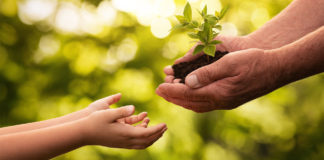Remember to rest
Sunday afternoons were a sacrosanct time when I was growing up in Argentina. Everything seemed to quiet and slow down between 2:00 and 5:00 pm, during siesta. Even shops would shut. All you could hear was the sound of the cicadas as the whole neighbourhood took a nap. Young and old, rich and poor were unified by this wonderful tradition. At least, I...
The face that transforms me
Every time I look through the lens of a microscope, I am struck by the realisation that beyond what the naked eye can see lies a universe far deeper and richer.
Searching for the ideal partner: how do you know you’ve found the right person?
The beginning of a romantic relationship is often sweet and exciting, full of novelty, enthusiasm, and the thrill of discovery. These early stages create a sense of well-being that leaves little room for doubt. At this point, each partner tends to downplay their weaknesses and highlight their strengths.
Christ in them
I notice people, and passionately collect their stories. My favourite stories include those small cracks that allow one to peek inside another soul, those moments when their voice is almost imperceptibly altered, the eyes light up for a reason I do not know, and their gestures are unexpected.
COVID-19: When time no longer means money
As a teenager, I remember pasting a quote from Blaise Pascal on the wall of my room. It was a thought I resonated with, not without some arrogance: "All of humanity's problems stem from man's inability to sit quietly in a room alone."
Biblical kings and controversial archaeologists
Traces of the ancient kingdom of Israel occasionally emerge from the dust of the Holy Land. These discoveries are immediately and inevitably followed by fierce controversies among archaeologists. As amateur spectators, Christians are eyewitnesses to these debates and, in one way or another, their faith is shaped by them.
The Christian pursuit of happiness
Humanity has not only reimagined God but has also redefined its expectations. Among Christians, many believe happiness is a promise made by God Himself. But what if this pursuit is nothing more than a chase after illusions?
A second chance: faith in the forgiveness that transforms us
Many years ago, while I was still in high school, our Romanian language and literature teacher assigned us the task of writing a framed story, complete with characters and a plot of our choosing.
Successfully going back to school
Want to start the new school year on the right foot? Here are some back-to-school tips that will help make that transition from holidays to school a lot easier.
The greatest love
The word sacrifice is not really a pleasant word. When you hear it, you may think of weird archaic rituals involving blood and animals. You may think of giving up something you love or like to save money or to save your waistline. Sacrifice is not a word we use often, and it’s often used with negative associations. But in a strange twist, the action...
Dangerous closeness: How to recognise and prevent abuse
Sexual abuse follows a predictable pattern, but unfortunately this pattern is not widely known. It is essential to recognise its early signs and profound effects for both protection and healing.
How does God answer prayers?
“I will stand at my watch and station myself on the ramparts; I will look to see what he will say to me” (Habakkuk 2:1).
What about hypocrisy?
Jesus’ woes are not uttered primarily in the face of sins such as theft, debauchery, or murder, about which we are so horrifed)—often hypocritically. His woes are directed precisely against hypocrisy[1], a form of soul pollution to which we often relate, unconsciously or not, laughing or smiling knowingly.
COVID-19: How can we transform the crisis?
Tens of thousands of articles about the new coronavirus crisis are filling news outlets around the world these days. What is the crisis, how we go through it, what to do, how to do, when to do it etc. Only one thing seems certain these days: our uncertainty about the future. We would prefer an authority to go out in public and tell...
COVID-19: Hope overcomes the fear of the unknown
In the spring of 1936, the members of the Lykov family made a decision that would change their lives forever: they disappeared into the Siberian taiga, completely isolating themselves from the world for the next 40 years.


























